
|
![]()
Greatest Films of the 1980s
1980 | 1981 | 1982 | 1983 | 1984 | 1985 | 1986 | 1987 | 1988 | 1989
Title Screen Film Genre(s), Title, Year, (Country), Length, Director, Description 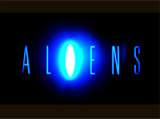



Aliens (1986), 137 minutes, D: James Cameron



The Assault (1986, Netherlands) (aka De Aanslag), 144 minutes, D: Fons Rademakers
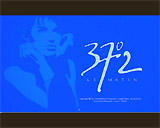



Betty Blue (1986, Fr.) (aka 37.2 Le Matin), 121 minutes, D: Jean-Jacques Beineix





Blue Velvet (1986), 120 minutes, D: David Lynch
Screenwriter and maverick director David Lynch's artistically bizarre, controversial, disturbing, off-beat cult film explored the corrupt, malevolent under-side of small town Americana in the mid-1980s. It provided an original look at sex, violence, crime and power under the peaceful exterior of suburbia. Beneath the familiar, peaceful, 'American-dream' cleanliness of the daytime scenes (with the eponymous white picket fence) lurked sleaziness, prostitution, unrestrained violence, and perversity - powerful and potentially-dangerous sexual forces that would be unleashed if not contained. Often criticized for its depiction of aberrant sexual behavior, the surrealistic, psychosexual film was a throwback to art films, 50s B-movies and teenage romances, film noir, and the mystery-suspense genre. In the story, following the heart-stroke collapse of his father (Jack Harvey) while watering his suburban lawn in a colorful opening sequence, college boy Jeffrey Beaumont (Kyle MacLachlan) returned to his middle-class hometown of Lumberton to help manage the family's hardware business. In a triggering scene, he came upon a severed human ear in an overgrown vacant field. [Note: The ear functioned later as a visual motif for the story.] With the help of his innocent, sweet, virginal high school teenaged neighbor Sandy Williams (Laura Dern), the daughter of the town's Detective Williams (George Dickerson), he investigated the bizarre mystery of the ear, and suspected that cabaret nightclub singer Dorothy Vallens (Isabella Rossellini) (who repeatedly sang Bobby Vinton's "Blue Velvet"), was somehow involved. With Sandy's help, Jeffrey daringly decided to surveil Dorothy by hiding in her apartment (after posing as an exterminator). Suddenly after voyeuristically watching her (wearing a blue-velvet bathrobe) from the inside of a closet and being discovered there - by a knife-wielding and masochistic Dorothy, he found himself ushered into (and participating in) a frightening, nightmarish world of violent sex, perversion, drug-addiction, and depraved degradation. He saw that she was further enslaved and cruelly victimized by a sadistic, demoniacal, obscenity-shouting, sexually-tormenting drug-dealer named Frank Booth (Dennis Hopper) - a deviant who psycho-sexually blackmailed her while holding her husband Don (Dick Green) and young son Little Donny (Jon Jon Snipes) hostage. The severed ear belonged to her kidnapped husband. Jeffrey took it upon himself to try and rescue Dorothy from her torment, but only exacerbated the situation with her (by establishing his own clandestine sexual relationship with her), became more psychopathically linked to Frank, and uncovered a much deeper illicit drug operation involving murder and police corruption. After being abducted and taken on a dangerous joyride by Frank and his gang, Jeffrey was introduced to effete, androgynous criminal Ben (Dean Stockwell) who memorably performed karaoke-style as he lip synched Roy Orbison's "In Dreams" pop tune. Frank's criminal enterprise was ultimately uncovered, and Jeffrey was forced to self-defensively shoot Frank in the forehead with a detective's gun. The film concluded when Sandy's prophetic dream of a robin returning to Lumberton came to fruition - bringing some sort of normality and peace to the troubled town with all the false comforts of the nostalgic 50s past, with her repeated observation: "It's a strange world."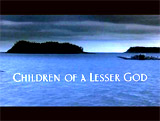


Children of a Lesser God (1986), 119 minutes, D: Randa Haines


The Color of Money (1986), 119 minutes, D: Martin Scorsese


"Crocodile" Dundee (1986), 102 minutes, D: Peter Faiman
This surprise, immensely-popular sleeper hit and romantic adventure comedy from Australia was at the time - the highest-grossing non-US film at the US box office ever. In the plot, American newspaper feature reporter Sue Charlton (Linda Kozlowski) - working for Newsday in NYC owned by her father - begged with her boorish boyfriend and editor Richard Mason (Mark Blum) to allow her to remain longer in Australia, to cover rugged crocodile hunter and poacher Michael (Mick) J. Dundee (Paul Hogan, co-nominated for Best Original Screenplay, and Kozlowski's real-life husband), nicknamed 'Crocodile.' Sue was intent on interviewing Dundee at his outback safari business at Walkabout Creek, known as Never Never Safari Tours. 'Crocodile' reportedly had his leg half-bitten off before crawling to safety (he bypassed a hospital for a pub). She was met in Darwin and taken by Dundee's business partner Walter "Wally" Reilly (John Meillon) by helicopter to the remote outpost, and confirmed that she would be paying $2,500 dollars for the exclusive story. It appeared Mick's exploit was a 'tall-tale' when pub bartender Ida (Maggie Blinco) laughed at Wally: "That story's gettin' better every time you tell it, Wally!" The uncouth Australian Outback ranger 'Crocodile' Dundee made a dramatic entrance into the town's pub with rowdy customers, while pretending to wrestle a crocodile (revealed to be stuffed) and throwing his large bushwhacker Bowie knife into the side of the wooden bar. Soon after, Sue and Dundee trekked to a camp in the outback to stay for a few nights - at the site where he was allegedly attacked. After Dundee expressed long-held misogynistic attitudes: "A city girl like you. You wouldn't last five minutes, love. This is man's country out here"; she agreed she was a "fish out of water" and called herself a "sheila" - but then to prove him wrong and to assert her independence, she trekked off alone (carrying a rifle) to an escarpment to later meet up with him. In the wild as she waded into the edge of a billabong in a black leotard to fill her canteen, a large crocodile lunged out of the water, grabbed her canteen strap, and threatened to pull her in; to the rescue, Dundee (who had been shadowing her) appeared and twisted a knife into the crocodile's head. To wrap up her story, she proposed that he join her and return to NYC (at the paper's expense). Dundee reacted to his upscale luxurious hotel suite at the Plaza Hotel on 5th Avenue, and while taking a stroll, he greeted everyone on a crowded sidewalk with "G'day!" During his time in NYC, he visited a number of bars, spun tall-tales, and even met a tall transvestite named Gwendoline (Anne Carlisle) (the first of two) and a pair of prostitutes: Karla (Nancy Mette) and Simone (Caitlin Clarke) and their mean pimp (John Snyder). Sue took Dundee on a whirlwind trip around NY's tourist sights, including a view of the Empire State Building from the Top of the Rock Observation Deck (sitting atop Rockefeller Center), and sampling his first hot-dog in Times Square. In the East Village during an attempted robbery of a woman's handbag on a busy sidewalk, Mick stopped the thief. And when the teenage leader (Tony Holmes) of a street gang of muggers with a small switch-blade knife attempted to accost Dundee and rob him - the unflappable and chuckling 'Crocodile Man' responded as he pulled out his large Bowie knife -- "THAT's a knife!" At a welcome-home dinner at the luxurious weekend home of Sue’s rich newspaper-owning father Sam Charlton (Michael Lombard), Richard unexpectedly proposed to Sue in front of everyone with an engagement ring and a kiss, and she foolishly agreed. Her abrupt acceptance caused Mick to leave the party. The next day, Mick checked out of the Plaza Hotel and walked to the nearest subway station, where he intended to set off to take a look at the rest of America on a "walkabout." After changing her mind about Richard's proposal, Sue raced on the street after Dundee from the hotel to the subway station entry two blocks away, but on the crowded platform, she could not reach him. After relaying messages through the crowd to each other, in the feel-good ending, Mick climbed up to the girders or rafters to gain height and walked to Sue on the heads and raised hands of the onlookers to tell her of his love and to kiss her. The aroused crowd erupted into applause - before a freeze-frame and the ending credits.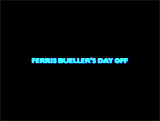

Ferris Bueller's Day Off (1986), 103 minutes, D: John Hughes
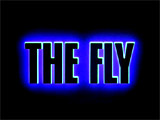

The Fly (1986), 100 minutes, D: David Cronenberg
This was one of the rare examples of director David Cronenberg's big-budget, mainstream Hollywood filmmaking. With gory and visceral special effects added, he remade the classic B-horror film from 1958 about how science and technology had caused dangerous human mutations. Eccentric, hapless scientist Dr. Seth Brundle (Jeff Goldblum) accidentally merged himself at a molecular-genetic level with an ordinary housefly during a teleportation incident using an experimental telepod device. As a newly deformed man-fly creature named Brundlefly, the creature struggled to maintain an emotional relationship with his pregnant lover/girlfriend, a magazine reporter named Veronica "Ronnie" Quaife (Geena Davis). In a famed "Insect Politics" speech, he warned Veronica to leave and never come back because he might hurt her. In the film's modified ending, a truly devastating and poignant conclusion, the anguished and completely disfigured 'Seth' wordlessly begged Veronica to kill him by guiding a shotgun's muzzle to his body with a deformed claw - a mercy killing to end his monstrous life.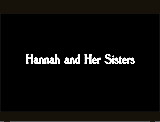


Hannah and Her Sisters (1986), 106 minutes, D: Woody Allen
Woody Allen's masterful, insightful comedy/drama about contemporary New Yorkers. This episodic film is full of vignettes woven together, and features some of the sharpest direction and writing of Allen's career. The threaded-together, multiple storylines, very typical of an ensemble film, focus on the lives of three sisters during a traditional Thanksgiving dinner gathering: the eldest sister - homemaker and 'matriarch' Hannah (Mia Farrow), the neurotic middle sister - actress Holly (Dianne Wiest in an Oscar-winning performance), and the emotional, free-spirited Lee (Barbara Hershey), and their relationships in mid-life crisis. There are other fully-developed characters all playing out their neuroses and lives: Hannah's ex-husband Mickey (Woody Allen) who has a despairing obsession with death, illness, and unhappiness; older and cynical Soho artist Frederick (Max Von Sydow) who lives with Lee; Hannah's adulterous, financial accountant husband Elliot (Michael Caine, also in an Oscar-winning role), who has a torrid but shallow love affair with Lee behind Hannah's and Frederick's backs; and Holly's desperate struggle to prove herself to the world. Even the peripheral characters are believable: the sisters' embittered show business parents (Maureen O'Sullivan and Lloyd Nolan), Holly's best friend and rival April (Carrie Fisher), as well as Mickey's assistant and voice of reason Gail (Julie Kavner). Although considered by some to be Allen's best work, it lost to Oliver Stone's Platoon (1986) for Best Picture.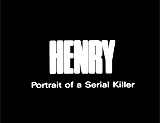




Henry: Portrait of a Serial Killer (1986) (released in 1990), 90 minutes, D: John McNaughton
The crime spree in this highly-controversial, low-budget and notorious movie, made with a cinema-verite documentary style, was loosely based on real-life murderer Henry Lee Lucas. There were over a dozen sickening, brutally-violent killings by psychotic serial killer Henry (Michael Rooker). Interspersed in the gritty film's action were still shots (death poses) of his trail of carnage in Illinois, sometimes with accompanying sounds of victims' screams or death struggle. The most upsetting and disturbing murder was the videotaped killing of a helpless family of three in their suburban home, videotaped for repeated viewings by both Henry and his roommate and partner in crime Otis (Tom Towles) as entertainment.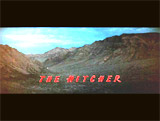

The Hitcher (1986), 96 minutes, D: Robert Harmon



Manhunter (1986), 119 minutes, D: Michael Mann


Manon of the Spring (1986, Fr./It./Switz) (aka Manon Des Sources), 113 minutes, D: Claude Berri
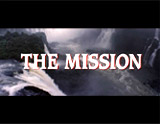



The Mission (1986, UK), 126 minutes, D: Roland Joffe




Mona Lisa (1986, UK), 104 minutes, D: Neil Jordan
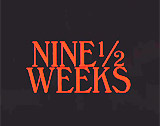


Nine 1/2 Weeks (1986), 117 minutes, D: Adrian Lyne



Platoon (1986), 111 minutes, D: Oliver Stone
A harrowing, visceral, realistic, visually-shattering Vietnam-war film, a Best Picture-winner based on the writer/director's own first-hand knowledge as a Vietnam combat soldier. Young, naive, 19 year-old enlisted infantry soldier Chris (Charlie Sheen) served in Vietnam in a fragmented, schizoid, rifle platoon/troop under two radically-different, veteran officers: pot-smoking, compassionate Sgt. Elias (Willem Dafoe) and boozing, fierce Sgt. Barnes (Tom Berenger). In the violence of combat, the two 'good' and 'bad' sergeants clashed, forcing Chris to examine his own loyalty and perspective toward violence. The first film in Vietnam veteran Oliver Stone's Vietnam trilogy, followed by Born of the Fourth of July (1989) and Heaven and Earth (1993).



Salvador (1986, UK/US), 123 minutes, D: Oliver Stone
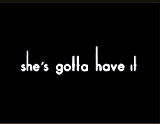


She's Gotta Have It (1986), 85 minutes, D: Spike Lee
Black movie-making emerged in a stronger state in the mid-80s, with films from independent film writer-director-star Spike Lee. The influential African-American film-maker independently produced this R-rated low-budget feminist comedy, his debut feature film with unknown black performers. It won the Prix de Jeunesse award at Cannes, and helped to usher in the American independent film movement in the mid-1980s. Budgeted at about $175,000, Lee's film was reportedly made in about two weeks with over-drawn credit cards. The hip romantic comedy was revolutionary in its tale of liberated, sexually-voracious graphic artist Nola Darling (Tracy Camilla Johns), a free-thinking, upscale black Brooklynite who juggled disparate boyfriends in a three-way love triangle to provide herself with different emotional and sexual needs, filmed in Rashomon-like style.

Sherman's March (1986) (aka Sherman's March: A Meditation on the Possibility of Romantic Love in the South During an Era of Nuclear Weapons Proliferation), 157 minutes, D: Ross McElwee
Native Southerner Ross McElwee wrote and directed this self-indulgent, hypnotic sleeper hit about his own modern retracing of General Sherman's destructive route through the South during the Civil War. It followed his leisurely, meandering portrait of the South and a collection of quirky Southerners living there. With previous failed relationships on the mind of the middle-aged, unmarried, lonely documentarian (with recurring dreams of nuclear war), he was mostly searching for romantic love - and continually sidetracked and drawn to interviewing scene-stealing potential mates with his movie camera instantly establishing rapport. Cute Pat Rendleman (Herself), an optimistic, open-minded and sunny female, performed cellulite crunches (without underpants), described strange screenplay ideas, and aspired to be an actress in a Burt Reynolds film. It was a novel film for its time, although reality TV and the proliferation of video journals has already made this kind of first-person, non-fiction approach very commonplace. He mused in his personal documentary: "It seems I'm filming my life in order to have a life to film...filming has become the only way that I can relate to women."


Something Wild (1986), 113 minutes, D: Jonathan Demme
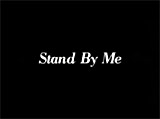


Stand By Me (1986), 87 minutes, D: Rob Reiner
This nostalgic, seminal coming-of-age film, mostly told in flashback, was based on Stephen King's 1982 short story The Body, originally published in his 4-novella collection titled Different Seasons. It was director Rob Reiner's first real hit film, paving the way for his future success. The bittersweet film opened with voice-over narration by the Writer (Richard Dreyfuss) - introducing a flashback to the late 1950s: "I was 12 going on 13 the first time I saw a dead human being. It happened in the summer of 1959 - a long time ago." He poignantly recollected his friendships in an inseparable quartet of young schoolboy buddies during their hiking adventures in Oregon, including their quest for a rumored, missing dead body, and their dodging of a locomotive on a bridge trestle. It ended with the Writer lamenting: "I never had any friends later on like the ones I had when I was twelve. Jesus, does anybody?" Author King happily regarded the film as the first successful translation of any of his works.




Top Gun (1986), 110 minutes, D: Tony Scott
Director Tony Scott's jingoistic, dramatic action film, produced by Don Simpson and Jerry Bruckheimer for Paramount Pictures, became the highest-grossing film of 1986. The entire film was basically about male bonding, patriotism, fast action, and machismo (high-fives, a bare-chested volleyball game, locker room scenes). Its major catchphrase was: "I feel the need, the need for speed." Besides the thin glossy love-plot and comic-book tone (all the nicknamed characters), the feverishly-choreographed film served as a recruitment tool for the USAF and its boy-toy fighter jets, and became the quintessential joy-ride action film of the 1980s, with its many death-defying, sensational, complex and competitive aerobatic dog-fight action in aerial sequences and a loud, pumped-up pop music soundtrack. After dogfights with two Russian MiG fighters over the Indian Ocean, the disobedient, headstrong, arrogant, unorthodox, hot-shot young US Navy fighter pilot Lt. Pete "Maverick" Mitchell (Tom Cruise), with his fellow Radar Intercept Officer (RIO) pilot Lt. Nicholas "Goose" Bradshaw (Anthony Edwards), were reluctantly selected by the USS Enterprise's Airgroup Commander Tom "Stinger" Jardian (James Tolkan) to be entered into a rigorous, elite combat training program known as Top Gun at the US Navy's elite Fighter Weapon School, Miramar Naval Air Station, near San Diego. Immediately, they knew they would be competing against and challenged by the highly-competitive and talented rival air-ace Lt. Tom 'Iceman' Kazansky (Val Kilmer). During the second day at the training, Maverick was thoroughly embarrassed to learn that pretty blonde - Charlotte "Charlie" Blackwood (Kelly McGillis), whom he had attempted to seduce the night before at a bar, was an astrophysicist with a PhD. and Top Gun's civilian consultant-instructor from the DOD. During exercises against the School's resident "enemy" pilot - Top Gun naval aviator Lt. Comm. Rick "Jester" Heatherly (Michael Ironside), Maverick and Goose defeated him with two incredibly daring and disobedient stunts, flying below the minimum engagement altitude of 10,000 feet, and buzzing the airfield's control tower. "Iceman" and his partner RIO Ron "Slider" Kerner (Rick Rossovich) criticized Maverick's dangerous risk-taking, and the two were reprimanded for their unsafe behavior and disobedience by their Commanding Officer Mike "Viper" Metcalf (Tom Skerritt) - a Vietnam War veteran who had served in combat with "Duke" Mitchell, Maverick's deceased father. "Goose" thought that Maverick's disobedience was because he was always flying against the "ghost" of his father's sullied reputation. Meanwhile, the relationship between Maverick and Charlie began to heat up with flirtations, dinner, and her confession that she had criticized him publically in class to cover over the fact of her true love for him (and that she wasn't showing him favoritism), and that she actually admired his skilled and genius flying. During another training exercise, Maverick was taught that he should prioritize teamwork rather than individual skill, when he was shot down during the simulated warfare: ("Bingo, Maverick's dead. You're out of there, kid"). In the film's most dramatic and emotional sequence, "Iceman" and Maverick were competing in the top two spots for the flying trophy two weeks before graduation. The highly-impatient Maverick flew too close and went through Iceman's wake of air turbulence from his thrusters, flamed out and stalled the engines; they went into an unrecoverable tailspin and were quickly losing altitude. Goose lost his life after he pulled Maverick's emergency ejection handle, and suffered fatal head injuries during his own ejection when he slammed into the jettisoned plane's canopy head-first. The two parachuted safely, but Goose was already dead. The death was devastating for the guilt-ridden and anxiety-stricken Maverick, and although officially cleared of blame for the incident that was not considered his fault, his subsequent flying performance suffered and he seriously considered quitting. The film's turning point came when Maverick visited "Viper's" home to speak with him, and learned that his father Duke had died heroically (he was wounded and could have saved himself, but he sacrificed himself in a dogfight and saved three other planes - his actions were kept secret and "classified"). Maverick's self-confidence returned and he decided to attend graduation, where he congratulated the "Iceman" for being awarded the Top Gun trophy as "Best Fighter Pilot." Immediately afterwards, Maverick and other fliers were reassigned back to the USS Enterprise aircraft carrier in the Indian Ocean, to serve on a rescue mission. During aerial combat with six Russian MiG fighters, Maverick summoned the courage to successfully defend his fellow pilots and to assist Iceman as his wingman. Rewarded for his heroism, Maverick chose to return to the Top Gun training facility as an instructor. In the ending scene at Miramar in a local bar, he reunited with Charlie, who had unexpectedly returned from her new Washington DC position to be with him, because he was reportedly "the best of the best."